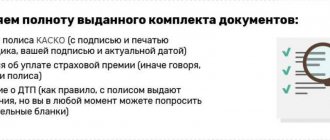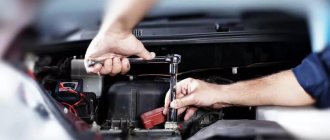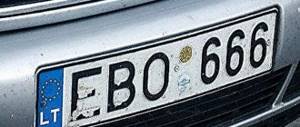Today, insurance companies, in addition to the mandatory product, offer CASCO insurance. When filling out a voluntary form, you should carefully study all the conditions for receiving compensation payments. In this case, it is worth further clarifying how the windshield is changed under CASCO. In the article we will consider what types of damage occur, in which case the insurer is guaranteed to transfer funds and in what way and how the windshield is replaced under CASCO step by step. We will also consider what needs to be done if the insurance company denies compensation payment under the CASCO policy.
Basic concepts about CASCO insurance policy
CASCO – voluntary insurance of a car against damage, loss or theft. If one of these events occurs, the insurance company compensates the victim for damage within the amount agreed upon in the contract. The policy may provide cash payment or in-kind compensation - repair or replacement of a specific part.
Under CASCO, unlike OSAGO, the driver insures his own property. Therefore, it does not matter who caused the accident. The main thing is that the policy owner fulfills the terms of the contract.
Attention! CASCO is a voluntary type of insurance. The driver has the right to enter into an agreement for any amount not exceeding the cost of the car and provide for a certain number of risks. CASCO can be paired with MTPL, but does not replace it.
What kind of glass to install is most often decided by the insurance company
Almost a third of claims to insurance companies are due to damage to the windshield. And any insurance company strives to minimize payments. Some insurance companies easily replace one spare part with the same one, that is, the original one. Other insurance companies have the concept “at the discretion of the insurance company.” According to their rules, the client receives a certified spare part. And glass has recently been classified as “spare parts”.
It is important to know that any glass is certified in our country - both Russian and Chinese. Which one to deliver is decided by the loss settlement department. And this may depend on the client’s insurance history.
— If you insure yourself under some cheap package without reading all the conditions, then 99% of the time there will be no compensation for glass losses at all. You will not get your money back or exchange it free of charge. If the cost of CASCO is too low, it means that there are some special conditions - a deductible or insurance taking into account wear and tear.
— I would advise you to make a preliminary calculation before closing the loss. Some insurers do this for free. Knowing the amount, you can choose - take the money, go to a service station according to the list of the insurance company, or change it yourself and provide documents from the service station where the replacement was carried out. But this may also end with the insurance company not agreeing with the amount you paid at the service station.
Many contracts state that the final decision on the cost of repairs is made by the insurance company. Neither the service station nor the client can insist on what glass to install on the car.
“But you have to understand that there are cars where you won’t be able to install anything other than the “original.” If the glass has road marking recognition, cameras, sensors - in this case only the original is used. For example, we don’t even offer non-original glass on the Citroen C4 Picasso. Although it is there. Large panoramic glass, high, curved.
A budget manufacturer cannot ensure that there are no distortions simply because its technology does not allow it. You install such glass and problems begin: the road floats, the image is crooked. The high price, of course, is a deterrent, but we still offer only original glass, despite the desire to retain the client.
Is it possible that a car owner received payment for the original glass, but installed the cheapest Chinese or Russian glass and pocketed the difference?
— The client has the right to do whatever he wants with the money received. Don't even change the glass at all. The insurance conditions stipulate that after you have made a car, you are obliged to submit it to the insurance company for inspection by an expert and re-photographing. But there are no tools yet to demand the difference in money back from the client. But if you break it a second time and apply to your insurance for compensation, then they will already charge you the cost of Chinese glass.
When making payments under a compulsory civil liability insurance policy, it is customary for us to run to the insurance company and receive compensation in cash. As a rule, this amount is less than the cost of repairs. In addition, the cost of glass, like other spare parts, is paid taking into account wear and tear. Last year the rules changed, and with compulsory insurance you can get a referral to a service station. There are certain caveats, but this is often more profitable than getting cash and looking for where to change the glass yourself.
— For example, we have an agreement with certain companies, when a person does not have to go to the insurance company for something like replacing a windshield. He comes straight to us, changes the glass and leaves. But the insurance company gave this opportunity under certain conditions - non-original glass or glass without a logo, only to CASCO clients with a good insurance history.
Types of windshield damage
Even the most careful driver can break or damage the glass. CASCO insurance coverage includes the following damage to the windshield:
| Damage | Explanations |
| The battle | As a rule, in the event of a powerful impact, the windshield does not shatter into pieces, but is covered with a fine network of cracks and chips due to its multilayer structure. Repair in this case is impossible; replacement is necessary. Whether the insurance company will pay for it depends on the cause and nature of the damage. If the mechanical impact was directed from the street, this is almost always an insured event. |
| Chips | Chips are the result of mechanical impact on the glass. They come in different shapes: bull's eye, star, butterfly wings and so on. But almost all of them lead to cracks. Some insurers do not consider small single damage (up to 1–3 mm) as an insured event. Repair or replacement of glass under CASCO at RESO Guarantees and VSK due to chips is not carried out at all, unless they are accompanied by cracks. |
| Cracks | Cracks are thread-like, web-like or arc-shaped damage that grows over time. They often appear if chips are not repaired in time. An insured event is a crack that appears as a result of mechanical impact. The first sign of this is the presence of chips. If the glass is cracked due to the difference in temperatures in the cabin and outside or due to deformation of the body, the insurance company will not pay for its replacement. |
Other defects (scuffs and clouding, scratches) are not recognized by the insurance company as insurance. This is the result of natural wear and tear on the windshield.
What is an insured event?
Windshield damage occurs for various reasons. Not every event can be recognized as an insured event.
Consider when the insurance company pays money. Is, for example, a stone hitting the windshield an insured event?
What exactly will the insurance company pay for?
- damage to the glass by an object bouncing off a car in front or from the opposite direction, for example, gravel or stone hit;
- damage to glass as a result of illegal actions of third parties;
- damage resulting from objects falling onto the glass, including snow and ice;
- damage to the windshield as a result of a bird strike;
- natural disasters – hail, squally winds.
Types of damage
The reasons for the occurrence of glass damage are important for the appointment or refusal of payment under CASCO insurance. But no less important is the nature of the damage, what size the chip is, whether it interferes with the driver’s visibility, and so on.
Let's consider the types of damage that may be decisive for the purpose and amount of payments:
- a scratch in the driver's viewing area may be caused by the operation of the wipers;
- a chip more than 3 mm in diameter may be caused by a stone falling from under the wheels of another car;
- chipping within 10 cm from the edge of the glass may occur due to temperature changes;
- completely broken , glass can break entirely as a result of falling objects from the roof or balconies, including ice, snow and cases of vandalism by third parties;
- a significant crack may form as a result of a collision with animals or natural disasters.
It is interesting that the CASCO policy does not cover everyone from the list presented; let’s consider in which case the insurance company may refuse to pay.
When can funds be refused?
What the insurance company definitely won’t pay for:
- damage was caused by thermal effects due to overheating;
- damage was caused by changes in natural temperature;
- defective glass;
- due to non-compliance with glass installation technology;
- if the limit of circulation without certificates from competent authorities is exceeded in case of their absence;
- general exceptions according to insurance rules: the event occurred outside the insurance territory (in another country), the driver was drunk or refused to undergo a medical examination (confirmed by the traffic police);
- abrasions;
- damage caused by the car owner himself due to careless actions;
- False information is provided when the nature of the damage does not correspond to the stated circumstances of the event.
If the cost of repairs is covered by the deductible
If the insurance contract provides for a deductible, you should clarify the amount of expenses in order to understand whether the insurance company will pay or not. This can be done at your dealer.
The franchise can be:
- Unconditional is a set amount that is not covered by insurance for each insured event. For example, if the size of the unconditional deductible is 10 thousand rubles, and the amount of damage is 18 thousand rubles, the insurance company will pay only 8 thousand rubles. And so on for every CASCO claim, regardless of the insured event.
- A conditional deductible is a set amount that is not covered by insurance if the amount of compensation is equal to this amount or less. If the damage is more than the amount of the conditional deductible, then the insurance company pays in full for the damage. For example, the conditional deductible under the policy is 10 thousand rubles, and the amount of payment is 8 thousand rubles. – the insurance company does not pay if the damage is 11 thousand rubles. or more – the insurance company pays the entire amount.
In the insurance contract, in the franchise column, its type (conditional or unconditional) and amount are indicated. Motorists who choose a franchise agreement pay less for insurance. Therefore, when choosing the terms of the contract, car owners should take into account priorities.
If a similar request has already been made this year
Insurance companies provide clients with a green corridor - the right to file an insured event without providing certificates from the competent authorities (traffic police, police department).
The conditions for the green corridor of the selected insurance company should be clarified when signing the contract. This can be an unlimited number of times or 1-2 times during the policy period, subject to certain conditions:
- Each previous damage must be repaired (this is confirmed by documents from the service station that replaced the windshield).
- There should be no other damage to the car from the same event (for example, if there was a collision with a bird and the windshield, headlights and front bumper were damaged, the traffic police should be called).
- In some insurance companies, in cases of vandalism (illegal actions of third parties), it is mandatory to provide documents from the Department of Internal Affairs regarding the investigation. This is due to the possibility of recourse against the culprit if he is caught.
If you study and comply with the terms and conditions of the specific insurance company, if the windshield is damaged again, the damage will be reimbursed.
Scuffs
Scuffs occur as a result of the operation of windshield wipers or when cleaning the glass with a car brush to remove dirt, ice or snow. Such damage is not recognized as an insured event and is not covered by insurance.
Damage not due to mechanical impact
In addition to mechanical impact, the windshield can be damaged due to thermal effects or changes in natural temperature.
A crack forms parallel 10 cm from the bottom edge of the glass when the car heater overheats.
The length of the crack can be from the left edge to the right.
This occurs because the glass expands from the inside when the temperature in the cabin rises to 16 C°, and contracts from the outside at a temperature of minus 10 C°. This event is not an insured event and is not covered by the insurance policy.
The glass may also crack due to a manufacturing defect.
Proof of such a reason is only an independent technical examination. An event may be recognized as a warranty event, but not an insured event. The dealer is required to replace the glass under warranty.
What should you do if there is a crack not caused by a chip if you have insurance? Is it possible to replace the windshield at the expense of CASCO?
Any crack not caused by a chip will be a reason for inspection by the insurance company for a non-insurable event. If there is no chip, then a trace examination will help determine the nature of the crack formation.
Chips are indicated in the initial inspection report upon registration
If, when concluding a CASCO insurance contract, damage to the windshield is indicated in the pre-insurance inspection report, then insurance coverage does not apply to it.
The car owner should repair the damage himself and provide the Insurer with documents on repairs and show the car in a repaired state. After which, the windshield will be restored to its coating.
Damage to glass during insurance may occur in the case of insuring a car that is not new. If a new car receives glass damage during transportation from the factory to the official dealer station, replacement of the glass will be at the expense of the carrier.
Attention! When prolonging the CASCO contract (extension) in the same insurance company, subject to compliance with the Insurance Rules, the replacement will be at the expense of the insurance company.
Insured events under the policy
Car owners should be well aware of the terms of the contract with their insurance company. After all, as a rule, glass replacement under CASCO is possible if the damage occurred as a result of an insured event. These include:
- Road accidents – collisions of two or more road users, non-contact accidents, collisions with obstacles.
- Actions of third parties – intentional crimes and offenses.
- Fire is an uncontrolled burning or explosion.
- Natural disasters - storm, gale, strong wind, hurricane, hail, earthquake.
- Accidents on the road that did not occur at the will of the insured - stones, gravel from under the wheels of cars, hitting a hole due to subsidence of the soil, destruction of the road surface.
- Other situations in the parking lot that did not occur due to the will of the driver - falling of a tree, icicle, snow from the roof, impact of animals.
It is important to know! The exact list of situations is described in the insurance contract and depends on the needs of the client and the conditions of the insurance policy. For example, replacing a windshield under CASCO insurance at Rosgosstrakh is not possible if it is damaged due to exposure to animals.
Insurance programs
Typically, glass can be replaced under a CASCO agreement in almost any case. The main thing is to pay attention to what insurance risks were included in the contract.
Insurers offer three insurance programs:
- "Theft";
- "Damage";
- "Road accident."
It is clear that it will not be possible to replace the glass if the policyholder chooses only the “Theft” risk. It is necessary that either only the “Damage” risk, or only the “Road Accident” risk, or both of these risks were insured. It is better to choose insurance for both of these risks.
Rationale - when insuring against the risk of “road accident”, the insurer will pay compensation or repair the glass only if its damage occurs when the insured vehicle is moving (for example, when hitting an obstacle, when it rolls over or collides with another vehicle), as well as when colliding with another vehicle on a stationary insured car.
With the “Damage” risk, the car owner is compensated for damage in almost any situation in which the glass is damaged:
- fire;
- fallen tree;
- disaster;
- illegal actions of 3 persons;
- sinking into the ground;
- man-made disaster, etc.
Important! Damage to car glass may be considered a warranty issue if the car is still under warranty. They can replace it under warranty if it is proven that the car owner did not violate the operating conditions of the vehicle, and the glass cracked as a result of a manufacturing defect.
Conditions for windshield replacement under CASCO
Most insurance companies allow you to change or repair side, windshield and rear glass elements, headlights, mirrors without supporting documentation from the traffic police and other departments. Conditions depend on the contract. Windshield replacement under CASCO “RESO Guarantee” and “Consent” can be carried out an unlimited number of times while the policy is valid. And Rosgosstrakh provides this opportunity only to owners of cars and buses.
The standard procedure for replacing a windshield under a CASCO policy involves the insured person contacting the competent authorities, depending on the circumstances of the incident:
- Road accidents or any accidents that occurred while driving - to the traffic police;
- illegal actions of third parties, natural disaster, accident that occurred in the parking lot - contact the police.
The purpose of contacting the competent authorities is to confirm the insured event.
For example, glass can crack if a pebble hits it from under the wheels of another traffic participant. If this happens on the road, the driver must stop and call the traffic police. The arriving inspector will draw up an inspection report with a diagram and issue a decision to refuse to initiate an administrative case. With these documents, the CASCO owner submits an application to open an insurance claim. The insurance company orders an inspection of the car, and, if there are no grounds for refusal, issues a referral to a service station (service station) for repair or replacement of glass.
Controversial situations
Often the insurance company does not agree that the damage to the windshield corresponds to the insured event. The insurer may refuse compensation or replacement if a manufacturing defect is discovered - then the dealer is obliged to compensate for the damage.
If the dealer refuses its obligations, you will have to go to court, and it will order an independent examination, for which the losing party in the result will pay. The court must provide certificates from the insurer and dealer about the refusal to resolve the problem peacefully.
Options for receiving compensation
An insurance contract may provide for monetary or in-kind compensation. As a rule, the second type is used for glass elements. When inspecting the vehicle, the appraiser determines whether a part needs repair or replacement, taking into account the recommendations of the vehicle manufacturer. Based on this, a referral to the service station is issued.
How the windshield will be replaced depends on the insurance rules and CASCO conditions:
- The insurance company issues a referral and then pays the bill from the service station. A good option for the client, as you can influence the choice of glass.
- The driver buys the part himself, and the insurance company reimburses him for expenses using a receipt, acceptance certificate or other payment documents and issues a referral for installation.
Which service station the client will be directed to depends on the insurance conditions. When replacing a windshield under CASCO insurance, Ingosstrakh gives the driver the right to choose “his” service station, but only from the proposed list. The list of stations with which the company has an agreement is quite wide: it includes many official dealers and authorized service centers.
How are they stated in the contract?
To get an answer to this question, you must first familiarize yourself with the terms of the CASCO insurance contract, which stipulates all insured events.
After all, all insurance companies offer their clients different CASCO insurance conditions, and there may be cases when replacement of damaged glass is not included in the list of insured events.
As a rule, the replacement of a windshield is specified in the contract, as is the replacement or repair of glass elements of a vehicle.
Such elements include not only the windshield, but also other vehicle windows, headlights, mirrors, etc.
In practice, the following situations may arise:
- the CASCO insurance contract may provide for a limited number of replacements of the vehicle windshield - in practice, many insurance companies provide for the replacement of glass elements only 2-3 times, and in case of subsequent damage, repairs are carried out at the expense of the vehicle owner;
- The car is only insured against theft - in this case the glass is not replaced;
- The insurance contract may provide for a more simplified scheme for payment of insurance compensation; in this case, there is no need to involve traffic police officers.
But before writing a statement and demanding payment of the amount of insurance compensation or replacement of the windshield of the vehicle, you must first read all the terms of the insurance contract and make sure that this damage to the vehicle glass is an insured event.
What documents are needed to apply for CASCO are listed in the article: documents for CASCO. Read about the terms of CASCO payments in case of total loss of a car here.
What kind of glass is included under CASCO insurance?
As a rule, the vehicle is equipped with glass of the brand recommended by the vehicle manufacturer. The service station can offer an alternative option, especially if the “original” is not in stock and you need to wait a long time for its delivery.
Car manufacturers do not make glass themselves, but purchase them from suppliers and mark them with their stamp. Therefore, you should not demand from a service station, for example, a real “original” from Mitsubishi. In addition, ordering a part directly from AGC (glass supplier for Mitsubishi) will be cheaper than from a car dealer.
Glass elements are insured in the standard assembly - as provided by the manufacturer. If the driver upgraded the glass (equipped with a rain sensor, heating) and did not warn the insurance company about this, in the event of an insured event, it will pay for the new part only in the “original” configuration.
Typical mistakes of expert appraisers
— People who count losses must have a clear understanding of all the intricacies associated with the replacement, repair and cost of glass. The first common mistake you may encounter is ignorance of the time standards for replacing a windshield. The maximum norm is 3 hours. Expert appraisers either overestimate or underestimate time standards.
Experts often make mistakes with the car's equipment. For example, for the Mercedes-Benz W221 there are seven glass sets. At seven different prices and manufacturers. The expert must know everything about the car’s equipment so that he can then call the service station and get the exact cost of the glass. According to Yulia Malakhovskaya, heated glass cannot be repaired.
— Another mistake is an incorrect assessment of the repairability or non-repairability of glass. Nowadays, the rules have already spelled out what kind of damage the glass needs to be repaired.
An expert appraiser must know all this in order to unambiguously decide what needs to be done with the glass - change or repair, and how much it will cost.
In what cases can the insurance company refuse?
There are many unpleasant situations in which a windshield cracks or breaks. But this problem is not always solved with the help of insurers. They will refuse to replace damaged glass if the driver:
- violated the vehicle operating rules established by the manufacturer, the terms of the contract, and the legislation of the Russian Federation;
- drove a car that was obviously faulty;
- did not have the right to drive a vehicle (he was deprived of his license, he was drunk);
- he himself caused damage to the car maliciously or accidentally, if this was not a consequence of an insured event;
- fled the scene of an accident or refused to undergo a medical examination (which is equivalent to driving a car while intoxicated according to Article 12.26 of the Code of Administrative Offenses of the Russian Federation);
- engaged in private driving for money, taught driving or participated in races (in such cases, insurance must be taken into account the planned activity);
- gave false information when concluding the contract;
- did not pay the insurance premium on time. Thus, replacing glass under CASCO insurance in Ingosstrakh is impossible if the driver is late with the next installment by more than 5 days - this leads to automatic termination of the contract.
Attention! There will be a refusal if the glass was damaged during a nuclear or radiation disaster, military operations, or during loading or unloading a car. All these are not insurance cases. An unlawful refusal by the insurance company can be challenged in court.
Options for compensation for damage under CASCO
There are two options:
- The insurance company gives a referral to a service station to replace the damaged glass free of charge.
- The client receives monetary compensation for the assessed damage to his bank account.
In this case, the insurance company pays for the full cycle of repair work, which includes dismantling the windshield or remaining fragments, the cost of new glass and a repair kit, and installation work.
The amount of compensation is calculated by the insurer's experts during an inspection of the car. If the client does not agree with the results of the assessment, he can invite an independent specialist to re-examine.
Replacement under a policy with a deductible
A deductible is the portion of losses that insurance companies do not cover when an insured event occurs. This condition significantly reduces the cost of CASCO insurance. Simply put, for a certain discount when taking out a policy, the client is ready to take on part of the cost of restorative repairs of the car.
There are many types of franchises. By default, unconditional is used, which is taken into account every time an insured event occurs. However, for most insurance companies, the franchise does not apply if glass elements are damaged if they require repair rather than replacement.
If the defect is not repairable, the deductible may make contacting the insurer pointless. For example, it is unconditional and amounts to 10,000 rubles, and the purchase and installation of a new part costs 8 thousand rubles. In this case, in fact, the client himself will pay the service station. The only plus is that glass replacement is cheaper than the same service provided separately to a private individual.
After replacing the glass, you must immediately show the car to the insurance company. If this is not done and a new breakdown occurs, the insurance company will not pay for repairs or replacement.
After inspecting the car, the Investigative Committee employee draws up a final report. By signing on it, the client confirms that the company has fulfilled its obligations under the contract. However, this does not relieve her from further liability if it turns out that the glass is defective or installed using the wrong technology.
Features of the franchise agreement
CASCO contracts in the Russian Federation may be concluded with the condition that the voluntary property insurance policy contains a franchise. It means a portion of losses in a fixed amount or as a percentage of the insured amount, which is not subject to compensation by the insurance company.
There are two types of franchises:
- conditional;
- unconditional.
In a conditional case, the insurer is generally exempt from paying compensation or organizing restoration repairs if the amount of losses does not exceed the amount of such a deductible. For example, the policy establishes a conditional deductible of 5,000 rubles. Accordingly, if the damage to the glass is estimated at 4999 rubles, then the insurer will not pay anything at all, but if it is 5001 rubles, then it will pay in full.
If unconditional, the insurer will in any case be obliged to pay compensation or organize restoration repairs. However, the amount of compensation will already be determined as the difference between the amount of damage and the amount of this deductible. For example, an unconditional rate of 5,000 rubles has been established. The damage to the glass was estimated at 12,000 rubles. Accordingly, the insurer will be required to pay only 7,000 rubles.
What is a CASCO franchise - video:
What kind of glass replacement work will be covered by the insurance company?
Under a CASCO policy, insurers are required to compensate the client for the costs of all repair work related to glass replacement:
- The full cost of this item;
- Removal of damaged windshield or its remains;
- Installation;
- Repair kit required for installation of a new element.
If the glass is completely replaced, the insurer must cover the costs of additional components provided by the manufacturer for the corresponding car model.
When will the insurance company refuse to pay or repair the glass?
The insurer may refuse to install a new element and reimburse losses in the following cases:
- If the situation that led to the damage does not correspond to the insured event specified in the CASCO policy;
- If the damage is subtle and does not interfere with a good view of the road from the driver’s seat;
- If the signed pre-insurance act indicated that there was already damage to the windshield, then this element is considered not insured;
- If under the CASCO policy the car was insured only against theft.
Find yours or contact us.
Question 1: How to sue an insurance company for CASCO?
Answer: If you disagree with the amount paid, or if the insurance company unlawfully refuses to pay the insurance compensation, or if the insurance company does not pay the insurance compensation within the period stipulated by the insurance rules, you first need to: assess your damage.
You need to contact an independent expert organization that will calculate the amount of damage caused to you as a result of the insured event. And based on the expert’s report, you need to go to court. Do not forget! CASCO is an individual product, and insurance conditions may be individual. Therefore, in case of refusal or insufficient payment, contact a lawyer for help.
Question 2: CASCO: money or repairs?
Answer: when concluding a voluntary vehicle insurance agreement, you can choose how it is more convenient for you to receive insurance compensation: in cash, or by sending it to a service station.
An appropriate note is placed in the insurance policy. If you choose repairs at a service station, you cannot write an application for insurance compensation in money. And vice versa: if you choose the “repair at a service station” option, but the insurer does not issue a referral within the period specified by the insurance rules, then when you go to court, you can demand compensation for damages in money.
Question 3: The insurance company does not pay money because it did not repair the car under CASCO?
Answer: if you receive an insurance compensation in cash, or if you insured a damaged car and subsequently repaired it at your own expense, you are obliged to provide the insurer with a repaired car. If you repaired the car, but, for one reason or another, did not provide it to the insurer, then in the event of an insured event in which previously repaired parts were damaged, the insurer has the right to refuse to pay insurance compensation for these parts.
Question 4: Repair under CASCO: terms?
Answer: A voluntary vehicle insurance agreement (CASCO) is an individual product; the timing of issuing a referral for repairs or paying insurance compensation may be individual for each client. These terms are specified in the insurance rules that were given to you when concluding the insurance contract.
Question 5: Compensation for damage under CASCO without a traffic police certificate.
Answer: Insurance rules may stipulate cases when you have the right to apply to the insurer for payment of insurance compensation, without certificates from the traffic police. As a rule, this is damage to the paintwork (paint coating) of one or two body parts or glass. If the insurance rules do not stipulate cases of contacting the insurer without certificates, then each insurance event must be confirmed by a document from the competent authorities.
Question 6: CASCO insurance refusal?
Answer: Often policyholders are faced with unlawful refusals by the insurer to pay insurance compensation; as a rule, they all boil down to the banal: “the nature of the damage does not correspond to the circumstances declared by the insured.” As a rule, insurers do not have legal and substantiated evidence of their position. If you receive a refusal to pay an insurance claim from your insurer, do not rush to give up; seek help from an experienced lawyer. Usually, all refusals can be challenged in court and insurance compensation can be obtained.
Question 6: You haven’t paid enough under CASCO, what should you do?
Answer: If you disagree with the amount paid, or if the insurance company unlawfully refuses to pay the insurance compensation, or if the insurance company does not pay the insurance compensation within the period stipulated by the insurance rules, you first need to: assess your damage.
You need to contact an independent expert organization that will calculate the amount of damage caused to you as a result of the insured event. And based on the expert’s report, you need to go to court. Do not forget! CASCO is an individual product, and insurance conditions may be individual. Therefore, in case of refusal or insufficient payment, contact a lawyer for help.
Question 7: Can the insurer refuse to accept the victim’s application?
Answer: NO! And again NO!!! The insurer is obliged to accept a statement from the victim. Whether he will pay for this application is another question, but the insurer MUST accept the application!
Question 8: How long does it take to sue an insurance company?
Answer: According to CASCO: you can sue the insurer within two years from the moment the policyholder learned, or should have learned, about the refusal to pay insurance compensation. According to OSAGO: for three years.
Question 9: Can I not make repairs at a service station and write an application for payment in cash?
Answer: If the insurance policy or insurance rules stipulate the possibility of receiving insurance compensation both by sending it to a service station and in cash equivalent, you can choose which compensation will be more convenient. If only a direction to a service station is agreed upon, or only money is agreed upon, then only one of the options is likely.
Question 10: Can I repair my car at my own expense and then claim compensation from the insurance company?
Answer: According to insurance rules, you are required to provide the damaged car to the insurer for inspection of the damaged vehicle. If you have fulfilled this obligation, then you have every right to repair the car at your own expense, and then demand compensation from the insurance company.
Question 11: They don’t pay for CASCO because... car sold unrepaired
Answer: If you provided the insurer with a damaged car for inspection and then sold it, and the insurer on this basis refuses to pay you insurance compensation, this refusal is illegal and must be challenged in court.
Question 12: If you haven’t saved your CASCO receipt?
Answer: If you haven’t saved the receipt for paying for your CASCO policy, that’s bad! This receipt is confirmation that the insurance premium under the voluntary vehicle insurance agreement has been paid by you in good faith. You need to be especially vigilant if you draw up an insurance contract through a brokerage agency. If you lose a receipt for payment of your MTPL policy, it’s not a big deal!
Question 13: Claim under CASCO if the second participant in the accident fled
Answer: If the culprit of the accident fled the scene, you need to:
- don't go anywhere;
- call the traffic police;
- register the damage, and then apply to the insurance company to receive insurance compensation.
The fact that the second participant fled the scene of the accident should not in any way affect the payment of insurance compensation. Otherwise, such a refusal can be challenged in court.
Question 14: How to force comprehensive insurance to pay at dealer prices?
Answer: If at the time of the accident your car is under warranty, the insurer is obliged to pay insurance compensation at dealer prices. If the car is not under warranty, insurance compensation is paid at average prices in a particular region.
Question 15: They crashed into a car at night and drove away - an insured event?
Answer: If you find damage to a parked car, you need to report it to the competent authorities. The main thing is that you don’t have to invent anything! If you haven't seen what caused the damage to your car, don't invent these reasons! The application must indicate that you discovered damage to the parked car. The absence of the culprit of the accident will not in any way affect the payment of insurance compensation, otherwise such refusal can be challenged in court. According to MTPL, this event will not be considered an insured event.
Question 16: The person at fault for the accident does not have insurance; can the insurance company refuse to pay under CASCO?
Answer: The absence of an insurance policy from the person at fault for the accident cannot be the reason for refusal of CASCO insurance.
Question 17: I was sent to a service center for repairs under CASCO, can I refuse and get the money?
Answer: If the insurance policy provides for receiving insurance compensation in cash, then it is possible, but if it only provides for a referral to a service station, then only a referral.
Question 18: Is it worth contacting the traffic police to obtain a certificate if a piece of iron flew out from under the wheels and damaged the body?
Answer: If the insurance rules provide for contacting the insurer without certificates for one or two body elements (as a rule, when the paintwork is damaged), and a piece of iron flying out from under the wheels damaged one or two body parts, then the employees do not need to be called. If there is no such condition in the rules, then you need to call the employees.
Procedure and conditions for replacement
Most often, replacing glass parts is possible without transferring documents from the State Traffic Inspectorate or other law enforcement agencies; this is called simplified registration. However, it is worth considering that this is the same part of the contract that must be spelled out. There are also insurances that make it possible to replace a glass element, but with a certain limit. For example, no more than 3 times in 1 year.
If you need to provide documentation from law enforcement agencies, in the event of an incident with a glass part, you will need to call a police inspector, who will give you the necessary documentation.
What to do next:
- notify the insurer of the occurrence of an insured event;
- draw up an application and payment of compensation;
- provide the vehicle to the insurance company to analyze the conditions of the accident;
- submit a package of necessary documentation;
- get a referral to a car service.
What list of documents will need to be prepared for submission:
- STS;
- insurance policy;
- civil passport of the Russian Federation;
- driver's license;
- protocol and certificates submitted by employees of the State Traffic Inspectorate.
The car service center where the spare part will be replaced is usually a partner of the insurer. In most cases, it becomes a service station, which deals specifically with the repair and replacement of glass elements of the vehicle. This type of service usually provides quality services.
If the glass breaks or is damaged far from a populated area, it is recommended to contact the insurer to coordinate your actions with him, so that later there will be no problems with payment of compensation. The insurer must perform all the work specified in the contract concluded when taking out the policy.
If there is a franchise
Simply put, a deductible is a certain amount of money that is used to reduce the cost of insurance. If the amount of compensation is less than this amount of money, the insurer is not obliged to pay compensation, therefore, the policyholder will deal with the restoration independently.
If the entire range of work required for replacement or restoration will cost more than the deductible, you can expect restoration under the CASCO policy. If the amount is lower, repairs will become a problem for the vehicle owner. In most cases, glass is repaired or replaced by drivers themselves. This happens because repairing and replacing glass does not cost a lot of money.
"RESO" - CASCO insurance case, what to do?
In order not to be denied insurance compensation, you must follow a certain procedure. It is usually specified in the insurance rules. If the car is stolen, then you need to act like this:
- Call the dispatch service. Numbers for residents of Moscow and the region, 8-800-234-18-02, for those living in St. Petersburg and the region, +7 (812) 346-85-52.
- Report the abduction to the police and write a corresponding statement to this department.
- Write an application to RESO and submit it within 24 hours.
Along with the application, you will need to present a policy, PTS, vehicle registration certificate, a set of factory keys and control panels, a certificate from the police department, and a resolution to initiate a criminal case.
If an accident occurs, the procedure is as follows:
- Call RESO dispatchers.
- Inform traffic police officers.
- Take photographs of the scene of the incident, the cars of the participants, and the damage that occurred.
- Write down the VIN of the vehicles involved and witnesses to the accident, as well as their registration numbers.
- Within 10 days, submit the car to RESO for inspection and within the same period write a statement about the damage received.
To receive a refund, you must bring your passport, insurance policy, payment receipt, driver's license, and diagnostic card to the company.
If the insured event is associated with the complete destruction or theft of a car, the payment of the insured amount is made within thirty days. In other situations, damages are compensated within twenty-five days.










